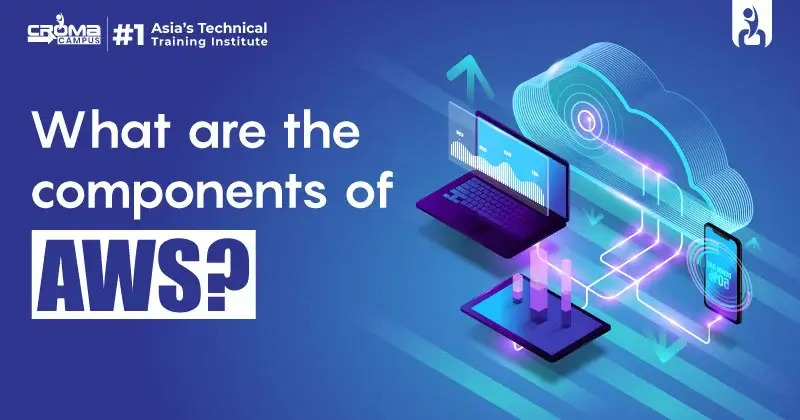
Introduction
Amazon Web Services (AWS) is a leading cloud computing platform offering a vast array of services designed to help businesses scale, innovate, and operate efficiently. With over 200 fully featured services, AWS caters to diverse needs ranging from compute power and storage to machine learning and security. This comprehensive suite of tools enables organizations to enhance their operations, improve performance, and stay competitive in the rapidly evolving digital landscape.
Components Of Amazon AWS
Amazon Web Services (AWS) is a comprehensive and widely adopted cloud platform. It offers over 200 fully featured services from data centers globally.
Here are the key AWS Components:
1. Compute Services
AWS provides various compute services that help users run their applications efficiently. The most notable ones include:
· Amazon EC2 (Elastic Compute Cloud): Allows users to rent virtual servers to run their applications.
· AWS Lambda: Enables users to run code without provisioning or managing servers. It automatically scales applications by running code in response to triggers.
· Amazon ECS (Elastic Container Service): Provides container orchestration services, allowing users to deploy, manage, and scale containerized applications.
· Amazon EKS (Elastic Kubernetes Service): A managed Kubernetes service for running Kubernetes applications.
2. Storage Services
AWS offers a range of storage services to meet diverse needs:
· Amazon S3 (Simple Storage Service): An object storage service that provides scalability, data availability, security, and performance.
· Amazon EBS (Elastic Block Store): Provides block storage volumes for use with Amazon EC2 instances. It’s highly available and consistent.
· Amazon EFS (Elastic File System): Offers scalable file storage that is easy to use and provides a simple interface to create and configure file systems quickly.
3. Database Services
AWS provides managed database services that support various database engines:
· Amazon RDS (Relational Database Service): Makes it easy to set up, operate, and scale a relational database in the cloud. It supports various database engines like MySQL, PostgreSQL, Oracle, and SQL Server.
· Amazon DynamoDB: A key-value and document database that delivers single-digit millisecond performance at any scale.
· Amazon Aurora: A MySQL and PostgreSQL-compatible relational database engine that combines the performance and availability of high-end commercial databases.
4. Networking Services
Networking is a critical AWS Component. AWS offers several networking services:
· Amazon VPC (Virtual Private Cloud): Allows users to create isolated networks within the AWS cloud, providing control over network configuration.
· AWS Direct Connect: Provides a dedicated network connection from the user’s premises to AWS.
· Amazon Route 53: A scalable Domain Name System (DNS) web service designed to route end-user requests to Internet applications.
5. Security, Identity, and Compliance
Security is a priority for AWS, which provides various tools to ensure data protection and compliance:
· AWS IAM (Identity and Access Management): Allows users to manage access to AWS services and resources securely.
· AWS Shield: A managed Distributed Denial of Service (DDoS) protection service that safeguards web applications running on AWS.
· AWS KMS (Key Management Service): Makes it easy to create and control encryption keys for securing data.
6. Management and Monitoring
AWS offers tools for monitoring and managing applications and infrastructure:
· Amazon CloudWatch: A monitoring service for AWS cloud resources and applications that provides data and actionable insights.
· AWS CloudFormation: Helps users model and set up their AWS resources using infrastructure as code.
· AWS Config: Enables users to assess, audit, and evaluate the configurations of their AWS resources.
7. Machine Learning and Artificial Intelligence
AWS has a robust set of machine learning (ML) and AI services:
· Amazon SageMaker: A fully managed service that provides tools to build, train, and deploy ML models.
· AWS Rekognition: A service for image and video analysis powered by deep learning.
· Amazon Lex: A service for building conversational interfaces using voice and text.
8. Developer Tools
AWS supports developers with various tools to streamline application development:
· AWS CodePipeline: A continuous integration and continuous delivery (CI/CD) service for fast and reliable application updates.
· AWS CodeBuild: A fully managed build service that compiles source code, runs tests, and produces software packages.
· AWS CodeDeploy: Automates code deployments to any instance, including Amazon EC2 and on-premises servers.
9. Content Delivery
AWS offers services to improve content delivery and enhance user experience:
· Amazon CloudFront: A fast content delivery network (CDN) service that securely delivers data, videos, applications, and APIs.
· AWS Global Accelerator: A service that improves the availability and performance of applications with global users.
10. Analytics
AWS provides powerful analytics services:
· Amazon Redshift: A fast, fully managed data warehouse that makes it simple to analyse data using standard SQL.
· Amazon Kinesis: Makes it easy to collect, process, and analyse real-time, streaming data.
AWS’s broad range of services enables businesses to operate more efficiently and scale their operations seamlessly.
Conclusion
To summarise, Amazon Web Services (AWS) offers a comprehensive suite of cloud services, from compute and storage to machine learning and analytics. These tools empower businesses to innovate, scale, and maintain robust, secure, and efficient operations, making AWS a pivotal choice for modern cloud computing needs. Aspiring professionals can check the AWS Certification Cost and join a training program for the bets skill development.









